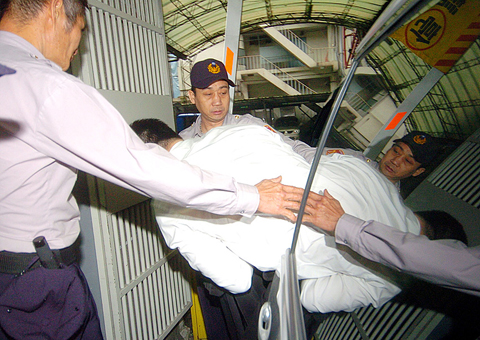Former Chinatrust Financial Holding Co (中信金控) vice chairman Jeffrey Koo Jr (辜仲諒) returned to Taiwan yesterday after being on the run for almost two years. He was immediately handcuffed and escorted to the Supreme Prosecutor Office’s Special Investigation Panel (SIP) for questioning.
All investigations involving Koo, who returned to Taiwan from Japan on his private plane around 9:45am, will now be handled by the SIP, a chief investigator said.
SIP spokesman Chen Yun-nan (陳雲南) said that after talking to State Public Prosecutor-General Chen Tsung-ming (陳聰明), it was decided that the probes, including one into Koo’s suspected role in a questionable financial deal and another into his possible role in alleged corruption involving the former first family, would be handled by the SIP.

PHOTO: CHANG CHIA-MING, TAIPEI TIMES
Koo has been on the Taipei District Prosecutors’ Office wanted list since December 2006 after twice failing to appear to answer questions regarding his role in Chinatrust Financial’s investment in Mega Financial Holding Co (兆豐金控) through its Hong Kong branch.
Chen Yun-nan said that Koo had “turned himself in voluntarily” as a defendant, which meant he had to be handcuffed in accordance with legal procedure.
The SIP spokesman denied that there had been any “under the table deal” facilitating Koo’s return from Japan.
“We did not make any deal with him,” Chen Yun-nan said. “He decided to come back to help us.”
Prosecutors were also anxious to talk to Koo about the sale of a piece of land in Taoyuan County owned by a development company controlled by Koo and his family, through which former president Chen Shui-bian’s (陳水扁) wife, Wu Shu-jen (吳淑珍), is alleged to have received NT$400 million (US$12 million) in kickbacks.
Jeffrey Koo Jr’s alleged involvement in the deal came to light on Nov. 14, when Taiwan Cement Corp (台泥) chairman Leslie Koo (辜成允), his uncle, told prosecutors that his nephew had introduced him to the former first lady’s friend Tsai Ming-cher (蔡明哲), who instructed Leslie Koo on where to wire a NT$400 million “commission” on the land purchase.
At press time yesterday, prosecutors were still questioning Jeffrey Koo Jr.
His father, Chinatrust Financial chairman Jeffrey Koo (辜濂松), was summoned late last month as a witness over the firm’s suspected role in the case against the former first family.
SIP prosecutors yesterday also questioned former vice premier Lin Hsin-yi (林信義) and former presidential aide Lin Teh-hsun (林德訓).
After Lin Hsin-yi left, prosecutors applied to release Lin Teh-hsun on NT$200,000 bail, a request that was immediately granted by the Taipei District Court.
The court barred Lin Teh-hsun, who had been in detention since Oct. 3, from moving house or leaving the country.

SECURITY: As China is ‘reshaping’ Hong Kong’s population, Taiwan must raise the eligibility threshold for applications from Hong Kongers, Chiu Chui-cheng said When Hong Kong and Macau citizens apply for residency in Taiwan, it would be under a new category that includes a “national security observation period,” Mainland Affairs Council (MAC) Minister Chiu Chui-cheng (邱垂正) said yesterday. President William Lai (賴清德) on March 13 announced 17 strategies to counter China’s aggression toward Taiwan, including incorporating national security considerations into the review process for residency applications from Hong Kong and Macau citizens. The situation in Hong Kong is constantly changing, Chiu said to media yesterday on the sidelines of the Taipei Technology Run hosted by the Taipei Neihu Technology Park Development Association. With

A US Marine Corps regiment equipped with Naval Strike Missiles (NSM) is set to participate in the upcoming Balikatan 25 exercise in the Luzon Strait, marking the system’s first-ever deployment in the Philippines. US and Philippine officials have separately confirmed that the Navy Marine Expeditionary Ship Interdiction System (NMESIS) — the mobile launch platform for the Naval Strike Missile — would take part in the joint exercise. The missiles are being deployed to “a strategic first island chain chokepoint” in the waters between Taiwan proper and the Philippines, US-based Naval News reported. “The Luzon Strait and Bashi Channel represent a critical access

‘FORM OF PROTEST’: The German Institute Taipei said it was ‘shocked’ to see Nazi symbolism used in connection with political aims as it condemned the incident Sung Chien-liang (宋建樑), who led efforts to recall Democratic Progressive Party (DPP) Legislator Lee Kun-cheng (李坤城), was released on bail of NT$80,000 yesterday amid an outcry over a Nazi armband he wore to questioning the night before. Sung arrived at the New Taipei City District Prosecutors’ Office for questioning in a recall petition forgery case on Tuesday night wearing a red armband bearing a swastika, carrying a copy of Adolf Hitler’s Mein Kampf and giving a Nazi salute. Sung left the building at 1:15am without the armband and apparently covering the book with a coat. This is a serious international scandal and Chinese

COUNTERINTELLIGENCE TRAINING: The ministry said 87.5 percent of the apprehended Chinese agents were reported by service members they tried to lure into becoming spies Taiwanese organized crime, illegal money lenders, temples and civic groups are complicit in Beijing’s infiltration of the armed forces, the Ministry of National Defense (MND) said in a report yesterday. Retired service members who had been turned to Beijing’s cause mainly relied on those channels to infiltrate the Taiwanese military, according to the report to be submitted to lawmakers ahead of tomorrow’s hearing on Chinese espionage in the military. Chinese intelligence typically used blackmail, Internet-based communications, bribery or debts to loan sharks to leverage active service personnel to do its bidding, it said. China’s main goals are to collect intelligence, and develop a